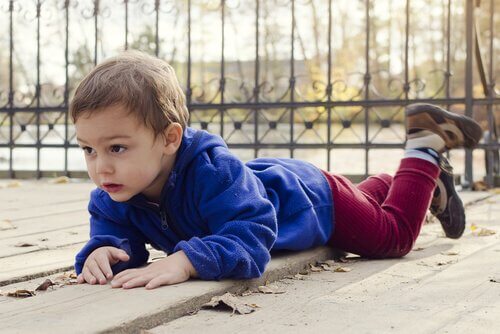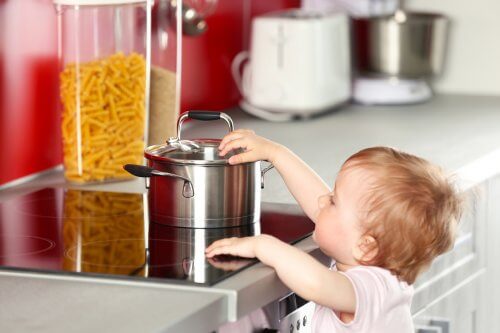4 Household Accidents that You Can Avoid


Written and verified by the doctor María Belén Del Río
Household accidents are the cause of many minor and major injuries involving children of all ages. In more serious cases they can even be fatal.
That’s why it’s so important that parents know what measures they can take to guarantee a safe space for their children. While you can’t avoid every potential mishap, you can prevent a number of them.
“Currently, accidents in developed countries are one of the main causes of illness and death. They constitute one of the ‘epidemics’ of this century and should be considered a public health concern. Besides loss of human life and physical and psychological suffering, it’s also important to consider the socioeconomic repercussions of injury.”
– FACUA Andalucia Guide (Spain) –
Keep in mind that the home is a place that should offer safety and tranquility for your family to enjoy. Therefore, identifying and eliminating potential dangers is a huge responsibility for adults.
It’s also important to prepare high-risk segments of the population (children under the age of 5, senior citizens and stay-at-home moms) to react to potentially dangerous domestic situations.
How to prevent the most common household accidents
Below is a list of the four most common household accidents, as well as ways you can prevent them.
1. Falls
This type of household accident is most often the result of the lack of motor maturity in children – in other words, the difficulties they still have when it comes to walking, maintaining balance, etc.
Falls can also happen because of objects lying around on the floor (such as toys) as well as a lack of adult supervision. To avoid falls in your home, we suggest the following measures:
- Keep walkways free of toys and other objects.
- Make sure that floors remain dry – mop up any spills, soggy footprints, etc., right away.
- Keep crib and playpen railings up when your baby is inside.
- Keep doors and windows locked and keep small children away from chairs, stairs, etc.

2. Choking and suffocation
These tragic episodes can happen when children ingest foreign objects, or when they cover their faces with pillows or blankets when they sleep. Parents should take the following precautions in order to avoid choking and suffocation:
- Choose toys that are safe for your child, according to age, and that don’t pose a choking hazard.
- Avoid plastic bags and any type of cord or string out of your children’s reach.
- Teach your children that they should sit still while eating in order to prevent choking on their food.
- Make sure that your children’s blankets aren’t too heavy and that they never cover their faces.
- Never leave your children unattended while bathing or near water, no matter how shallow.
3. Burns
Fire, hot water and kitchen appliances can cause serious burns to anybody, but especially to children. When it comes to household burns, it isn’t always just about superficial damage.
Rather, many incidents involve burns that require urgent medical attention. Therefore, the following preventative measures are recommended:
- Never hold a hot drink when you’re holding a baby, or leave a hot drink within a little one’s reach.
- Make sure that the foods and drinks you give your baby are at a safe temperature before offering them.
- Install a gate or fence in your kitchen entrance to keep children away from objects that are hot.
- Test bath water before putting your children in the tub.
- Keep matches, lighters and hot irons away from children.
4. Poisoning
Children may become exposed to toxic substances through the ingestion of medication, cleaning products, insecticides, and other household products. In many cases, poison is the result of an excessive intake of foods.
To keep this from happening, put the following measures into place:
- Establish a safe place for medications and chemical products. Preferably, they should be kept locked away or out of your children’s reach.
- Make sure that your children’s toys – especially play dough and molding clay – don’t contain toxic components.
- Teach your little ones that they should never take pills, capsules or syrups unless their parents administer them.
- Never put a dangerous chemical in a container made for food.

Conclusions about preventing household accidents
If you find yourself in the midst of one of these episodes, stay calm and request emergency medical assistance immediately. Make preventative measures a top priority so that you and your family don’t find yourself suffering due to household accidents.
Although you can’t avoid every unfortunate event, there are ways to increase safety measures in your home. That way, you can greatly reduce the chances of your children suffering from household accidents.
Household accidents are the cause of many minor and major injuries involving children of all ages. In more serious cases they can even be fatal.
That’s why it’s so important that parents know what measures they can take to guarantee a safe space for their children. While you can’t avoid every potential mishap, you can prevent a number of them.
“Currently, accidents in developed countries are one of the main causes of illness and death. They constitute one of the ‘epidemics’ of this century and should be considered a public health concern. Besides loss of human life and physical and psychological suffering, it’s also important to consider the socioeconomic repercussions of injury.”
– FACUA Andalucia Guide (Spain) –
Keep in mind that the home is a place that should offer safety and tranquility for your family to enjoy. Therefore, identifying and eliminating potential dangers is a huge responsibility for adults.
It’s also important to prepare high-risk segments of the population (children under the age of 5, senior citizens and stay-at-home moms) to react to potentially dangerous domestic situations.
How to prevent the most common household accidents
Below is a list of the four most common household accidents, as well as ways you can prevent them.
1. Falls
This type of household accident is most often the result of the lack of motor maturity in children – in other words, the difficulties they still have when it comes to walking, maintaining balance, etc.
Falls can also happen because of objects lying around on the floor (such as toys) as well as a lack of adult supervision. To avoid falls in your home, we suggest the following measures:
- Keep walkways free of toys and other objects.
- Make sure that floors remain dry – mop up any spills, soggy footprints, etc., right away.
- Keep crib and playpen railings up when your baby is inside.
- Keep doors and windows locked and keep small children away from chairs, stairs, etc.

2. Choking and suffocation
These tragic episodes can happen when children ingest foreign objects, or when they cover their faces with pillows or blankets when they sleep. Parents should take the following precautions in order to avoid choking and suffocation:
- Choose toys that are safe for your child, according to age, and that don’t pose a choking hazard.
- Avoid plastic bags and any type of cord or string out of your children’s reach.
- Teach your children that they should sit still while eating in order to prevent choking on their food.
- Make sure that your children’s blankets aren’t too heavy and that they never cover their faces.
- Never leave your children unattended while bathing or near water, no matter how shallow.
3. Burns
Fire, hot water and kitchen appliances can cause serious burns to anybody, but especially to children. When it comes to household burns, it isn’t always just about superficial damage.
Rather, many incidents involve burns that require urgent medical attention. Therefore, the following preventative measures are recommended:
- Never hold a hot drink when you’re holding a baby, or leave a hot drink within a little one’s reach.
- Make sure that the foods and drinks you give your baby are at a safe temperature before offering them.
- Install a gate or fence in your kitchen entrance to keep children away from objects that are hot.
- Test bath water before putting your children in the tub.
- Keep matches, lighters and hot irons away from children.
4. Poisoning
Children may become exposed to toxic substances through the ingestion of medication, cleaning products, insecticides, and other household products. In many cases, poison is the result of an excessive intake of foods.
To keep this from happening, put the following measures into place:
- Establish a safe place for medications and chemical products. Preferably, they should be kept locked away or out of your children’s reach.
- Make sure that your children’s toys – especially play dough and molding clay – don’t contain toxic components.
- Teach your little ones that they should never take pills, capsules or syrups unless their parents administer them.
- Never put a dangerous chemical in a container made for food.

Conclusions about preventing household accidents
If you find yourself in the midst of one of these episodes, stay calm and request emergency medical assistance immediately. Make preventative measures a top priority so that you and your family don’t find yourself suffering due to household accidents.
Although you can’t avoid every unfortunate event, there are ways to increase safety measures in your home. That way, you can greatly reduce the chances of your children suffering from household accidents.
This text is provided for informational purposes only and does not replace consultation with a professional. If in doubt, consult your specialist.








